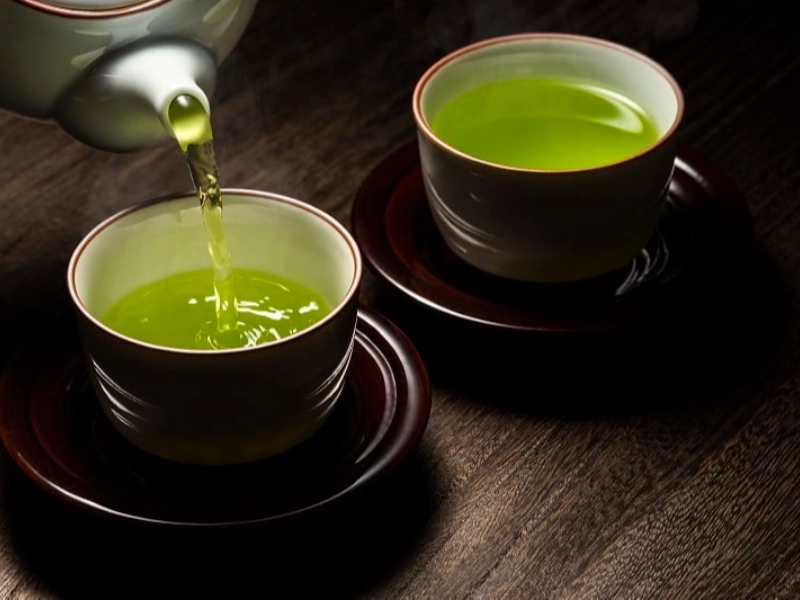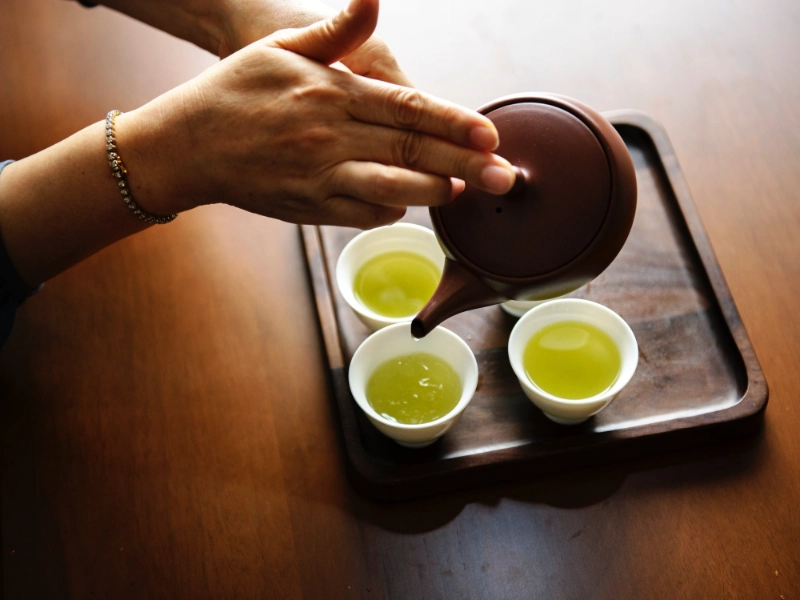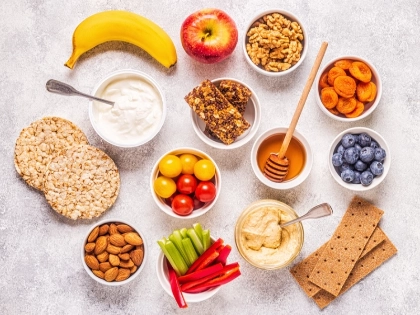The Benefits of Drinking Green Tea for Your Health
Unfermented leaves are used to make green tea, which has the highest concentration of polyphenols, which are potent antioxidants. These combat free radicals, which are substances that harm cells and cause a host of health issues. Green tea's low caffeine content aids in maintaining alertness without causing jitters or anxiety, which are linked to high-caffeine goods like coffee. It might also aid in preventing heart disease and lowering cholesterol.
1.Enhances Cardiovascular Well-being

2. Reduces Cancer Risk
 Antioxidant components in green tea have been associated with a lower risk of cancer. Strong tea polyphenols protect cells from genetic mutation and reduce the incidence of several malignancies by scavenging free radicals that cause oxidative damage and inhibiting DNA and RNA cell development (2).
It has been demonstrated that regular green tea drinking reduces the risk of lung cancer, esophageal cancer, colorectal cancer, and prostate cancer in nonsmoking women. Still, additional study is required on this topic.
Most people can safely drink green tea, however some drugs, like blood thinners and beta-blockers, may interact with it. Consult your doctor before consuming green tea if you are currently on any drugs (3).
Antioxidant components in green tea have been associated with a lower risk of cancer. Strong tea polyphenols protect cells from genetic mutation and reduce the incidence of several malignancies by scavenging free radicals that cause oxidative damage and inhibiting DNA and RNA cell development (2).
It has been demonstrated that regular green tea drinking reduces the risk of lung cancer, esophageal cancer, colorectal cancer, and prostate cancer in nonsmoking women. Still, additional study is required on this topic.
Most people can safely drink green tea, however some drugs, like blood thinners and beta-blockers, may interact with it. Consult your doctor before consuming green tea if you are currently on any drugs (3).
3. Reduces Diabetes Risk
 Catechins, which are found in green tea, have a beneficial effect on insulin sensitivity and aid in blood sugar regulation. Those who have diabetes may benefit from this. More clinical research is yet required in this area.
Furthermore, the body and mind may be soothed by the amino acid L-theanine found in green tea. This can lessen tension and stop blood pressure from rising.
People who drink at least five cups of unsweetened green tea a day are less likely to develop cardiovascular disease than those who don't, per a recent study published in the Nutrition Journal. However, before including green tea in their diet, persons who are nursing a baby, have anaemia or iron deficiency, or take medication should speak with their doctor.
Catechins, which are found in green tea, have a beneficial effect on insulin sensitivity and aid in blood sugar regulation. Those who have diabetes may benefit from this. More clinical research is yet required in this area.
Furthermore, the body and mind may be soothed by the amino acid L-theanine found in green tea. This can lessen tension and stop blood pressure from rising.
People who drink at least five cups of unsweetened green tea a day are less likely to develop cardiovascular disease than those who don't, per a recent study published in the Nutrition Journal. However, before including green tea in their diet, persons who are nursing a baby, have anaemia or iron deficiency, or take medication should speak with their doctor.
4. Lowers Alzheimer's Disease Risk
 Regular consumption of green tea has been shown by researchers to lower the risk of Alzheimer's disease. This is because tea contains chemicals like L-theanine and EGCG that may slow down cognitive ageing.
For a full year, thirty-three senior volunteers were randomly assigned to drink green tea or a placebo as part of the study. After that, they completed laboratory tests and evaluated their MMSE-J results.
Dementia risk was 16% lower in those who drank at least one cup of green tea per day. This was a notable decline, particularly for men and those in their mid-life.
Regular consumption of green tea has been shown by researchers to lower the risk of Alzheimer's disease. This is because tea contains chemicals like L-theanine and EGCG that may slow down cognitive ageing.
For a full year, thirty-three senior volunteers were randomly assigned to drink green tea or a placebo as part of the study. After that, they completed laboratory tests and evaluated their MMSE-J results.
Dementia risk was 16% lower in those who drank at least one cup of green tea per day. This was a notable decline, particularly for men and those in their mid-life.
5. Lowers Chance of Eye Conditions
 Green tea's antioxidants help shield the fragile tissues in your eyes from oxidative stress, which may lower your chance of developing conditions like glaucoma. According to one study, people who drank five or more cups of green tea a day were less likely than non-drinkers to acquire glaucoma.
Green tea's antioxidants, called catechins, are known to attach to the retina and take up harmful free radicals that can harm the eyes. Eat a diet high in the eye-healthy minerals lutein and zeaxanthin, which are also present in foods like spinach, collard greens, and kale, in addition to sipping green tea.
Green tea's antioxidants help shield the fragile tissues in your eyes from oxidative stress, which may lower your chance of developing conditions like glaucoma. According to one study, people who drank five or more cups of green tea a day were less likely than non-drinkers to acquire glaucoma.
Green tea's antioxidants, called catechins, are known to attach to the retina and take up harmful free radicals that can harm the eyes. Eat a diet high in the eye-healthy minerals lutein and zeaxanthin, which are also present in foods like spinach, collard greens, and kale, in addition to sipping green tea.
6. Reduces Stroke Risk
 Because green tea decreases blood pressure, it also lowers the risk of heart disease and stroke. In a 2020 research, it also helped avoid clots that can result in a stroke.
As part of the Health Examinees Study in Japan, researchers monitored the diets of individuals who had a heart attack or stroke and survived. It was discovered that those who regularly drank green tea had longer lifespans than those who did not. When compared to non-drinkers, stroke survivors who drank seven cups of green tea a day had a 62% lower chance of dying.
Because green tea decreases blood pressure, it also lowers the risk of heart disease and stroke. In a 2020 research, it also helped avoid clots that can result in a stroke.
As part of the Health Examinees Study in Japan, researchers monitored the diets of individuals who had a heart attack or stroke and survived. It was discovered that those who regularly drank green tea had longer lifespans than those who did not. When compared to non-drinkers, stroke survivors who drank seven cups of green tea a day had a 62% lower chance of dying.
7. Lowers Heart Attack Risk
 Green tea's antioxidants lower cholesterol, which in turn lessens the accumulation of atherosclerotic plaque in blood vessels, which can result in heart attacks and strokes. Additionally, high concentrations of polyphenols in green tea lower blood pressure, a significant risk factor for heart disease, according to a 2020 study published in the journal "Medicine."
A big Japanese study that tracked people for almost 13 years found that frequent drinkers of green tea had lower chances of diabetes, heart disease, and even pancreatic cancer. Those who regularly drink at least three cups of tea every day will profit the most from this habit.
Green tea's antioxidants lower cholesterol, which in turn lessens the accumulation of atherosclerotic plaque in blood vessels, which can result in heart attacks and strokes. Additionally, high concentrations of polyphenols in green tea lower blood pressure, a significant risk factor for heart disease, according to a 2020 study published in the journal "Medicine."
A big Japanese study that tracked people for almost 13 years found that frequent drinkers of green tea had lower chances of diabetes, heart disease, and even pancreatic cancer. Those who regularly drink at least three cups of tea every day will profit the most from this habit.












